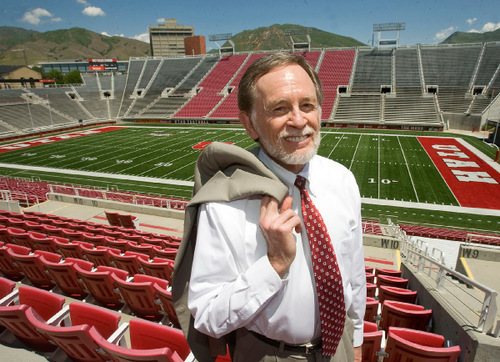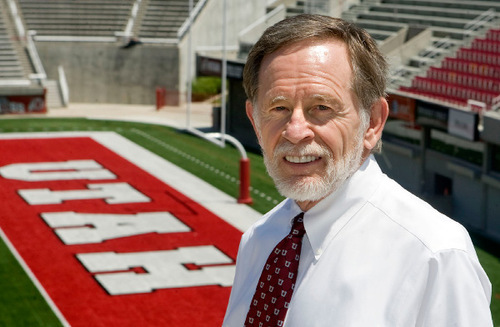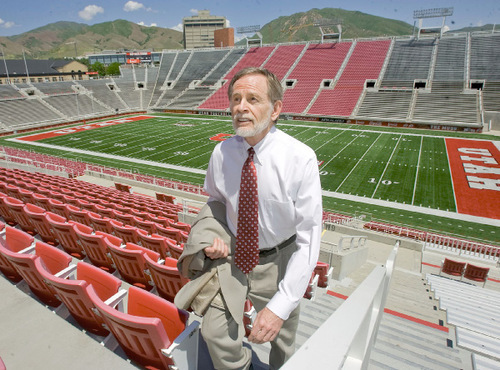This is an archived article that was published on sltrib.com in 2011, and information in the article may be outdated. It is provided only for personal research purposes and may not be reprinted.
The first time he served as a University of Utah trustee, Randy Dryer was a 21-year-old journalism student who earned his seat by being elected student body president. Typical students then wore shaggy hair, were engaged in the big political issues of the day — the war in Vietnam, civil rights and the incipient environmental movement — listened to music on transistor radios, watched professors lecture in front of blackboards and converged on a spot in the Student Union called the Huddle.
Student idealism these days plays out in service-learning projects, often abroad; music is delivered via iPod and Sirius, and of course, laptops and smartphones are everywhere on campus, enabling students to connect with each other, faculty and course content at any time, in any place. And the Huddle is a distant memory.
But more importantly, the university has grown into today's massive footprint, and it is getting even bigger thanks to a $1-billion campus construction boom and a burgeoning national reputation as a research and athletic powerhouse. It's no longer your dad's U., a regional school staffed with homegrown professors. Students and faculty now come from around the world, while cranes hover over the campus skyline, building up the university's research capacity.
"We have become a major economic engine. We are now providing so many different services to the community," said Dryer, whose term as a trustee expires this month, heralding the end of a tenure covering 17 noncontiguous years that spanned more than four decades under six U. presidents.
"The research enterprise has grown exponentially. That creates a need for support systems and everything to administer the grants and publish the findings," Dryer said. "The increase in research activities has made the university more like a big business."
Dryer, who grew up in Ogden, was the first-ever student to serve on the board, later served as a trustee as alumni president, then filled an unfinished term, and is now completing his second four-year term. Trustees at Utah schools are subject to an unofficial two-term limit, so it is unlikely that Dryer will be reappointed. Gov. Gary Herbert is expected to name successors to Dryer and trustees Roger Boyer and Jim Wall in the next few weeks.
Meanwhile, the U. trustees unanimously chose the recently reappointed Clark Ivory last week to succeed Dryer as chairman. Dryer was unique among trustees for his ability to bring the perspectives of a student, an alumni leader and a donor to the boardroom, according to the U.'s acting president, David Pershing.
"He's also been a faculty member; that gave him frontline experience which helped us get through these thorny issues," Pershing said. "He has been an excellent leader for the trustees. One of his real skills has been recognizing the role of the trustees in providing high-level leadership without getting mired down in the details of individual decisions."
Two watershed moments on Dryer's watch as chairman: The university's first Nobel Prize in 2007 and last summer's invitation to the premier Pacific Athletic Conference. Those achievements were years in the making.
"Those are culminations of slowly improving the research enterprise," said Dryer, an attorney with Salt Lake City firm Parsons Behle & Latimer. "Joining the Pac-12 was the result of going from a regional to a national university."
As the U. has grown into a $2.5-billion enterprise with an international reach, the higher-education landscape has changed. Today, campuses have a global flavor and technology has transformed the way educational content is delivered and the way professors and students interact.
"Back in the 1970s, it was a blackboard and lecture delivered in a physical classroom. That is being replaced with experiential learning, which is interactive and collaborative. Students learn from each other as much as from the professor, who is more of a facilitator than the fountain of wisdom," Dryer said.
The U., like the nation's other big universities, has had to adapt to rapid changes, putting a greater emphasis on living on campus, service-learning and educational technology. This embrace of the future can be seen in the U.'s Bennion Center, new residential halls, the expanding Honors College, which is building a residential complex by Legacy Bridge, and the freshly renovated Marriott Library, with its Knowledge Commons, high-tech classrooms and group-study rooms.
Dryer has done perhaps more than any other non-administrator to help navigate these shoals, not just as a trustee but also on the search committees that hired former President Michael Young, incoming Vice President of Health Sciences Vivian Lee and numerous deans, including Hyrum Chodosh of the law school.
His departure as a trustee coincides with a seismic shift in U. administrative leadership. Next year, Lee and four new associate vice presidents will be learning the ropes while a search is under way for Young's replacement. There will also be two or three new trustees, an unpaid but challenging assignment.
"It's harder to understand the university now. It's not only large, it's very diversified. There are so many moving parts, akin to a conglomerate with a lot of different product lines," Dryer said. "Your first task as a trustee is to learn about the institution. You can't provide meaningful guidance to administration unless you have a fundamental understanding of what the university is about. The only way you can do that is spend time learning, talking to people and observing, and you can't do that once a month in a trustees meeting."
bmaffly@sltrib.com Randy Dryer
Born in Long Beach, Calif., raised in Ogden, Dryer is the University of Utah's longest-serving trustee, covering 17 years spread over more than four decades.
By the time he stepped aside as chairman earlier this month, he had served under six U. presidents and on numerous boards and committees associated with the university, including leading the Alumni Association and helping found the hospital foundation.
He graduated from the U. with a degree in journalism in 1972, then with a law degree in 1976, and now is a litigator with an expertise in media law. He has also been an adjunct professor in the U. law and honors colleges.
Two of Dryer's children have law degrees, and his son, also a U. graduate, is in law school at the University of Colorado.







